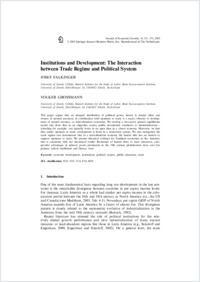Institutions and Development: The Interaction Between Trade Regime and Political System
BP2-STS
- Falkinger, Josef University of Zurich
- Grossmann, Volker ORCID University of Zurich
- 2005
Published in:
- Journal of Economic Growth. - Springer Science and Business Media LLC. - 2005, vol. 10, p. 231-272
English
This paper argues that an unequal distribution of political power, biased to landed elites and owners of natural resources, in combination with openness to trade is a major obstacle to development of natural resource- or land-abundant economies. We develop a two-sector general equilibrium model and show that in an oligarchic society public investments conducive to industrialization— schooling for example—are typically lower in an open than in a closed economy. Moreover, we find that, under openness to trade, development is faster in a democratic system. We also endogenize the trade regime and demonstrate that in a land-abundant economy the landed elite has an interest to support openness to trade. We present historical evidence for Southern economies in the Americas that is consistent with our theoretical results: Resistance of landed elites to mass education, comparative advantages in primary goods production in the 19th century globalization wave, and low primary school enrollment and literacy rates.
- Faculty
- Faculté des sciences économiques et sociales et du management
- Department
- Département d'économie politique
- Language
-
- English
- Classification
- Economics
- License
- Rights reserved
- Open access status
- green
- Identifiers
-
- DOI 10.1007/s10887-005-3534-4
- ISSN 1381-4338
- Persistent URL
- https://folia.unifr.ch/unifr/documents/323693
Statistics
Document views: 36
File downloads:
- s10887-005-3534-4.pdf: 100
